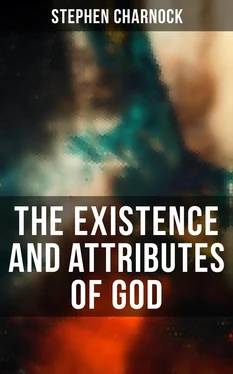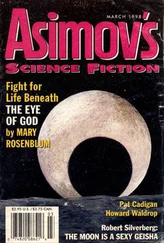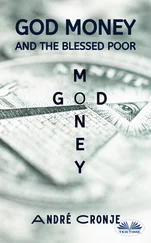Stephen Charnock - The Existence and Attributes of God
Здесь есть возможность читать онлайн «Stephen Charnock - The Existence and Attributes of God» — ознакомительный отрывок электронной книги совершенно бесплатно, а после прочтения отрывка купить полную версию. В некоторых случаях можно слушать аудио, скачать через торрент в формате fb2 и присутствует краткое содержание. Жанр: unrecognised, на английском языке. Описание произведения, (предисловие) а так же отзывы посетителей доступны на портале библиотеки ЛибКат.
- Название:The Existence and Attributes of God
- Автор:
- Жанр:
- Год:неизвестен
- ISBN:нет данных
- Рейтинг книги:5 / 5. Голосов: 1
-
Избранное:Добавить в избранное
- Отзывы:
-
Ваша оценка:
- 100
- 1
- 2
- 3
- 4
- 5
The Existence and Attributes of God: краткое содержание, описание и аннотация
Предлагаем к чтению аннотацию, описание, краткое содержание или предисловие (зависит от того, что написал сам автор книги «The Existence and Attributes of God»). Если вы не нашли необходимую информацию о книге — напишите в комментариях, мы постараемся отыскать её.
The Existence and Attributes of God — читать онлайн ознакомительный отрывок
Ниже представлен текст книги, разбитый по страницам. Система сохранения места последней прочитанной страницы, позволяет с удобством читать онлайн бесплатно книгу «The Existence and Attributes of God», без необходимости каждый раз заново искать на чём Вы остановились. Поставьте закладку, и сможете в любой момент перейти на страницу, на которой закончили чтение.
Интервал:
Закладка:
How should such a general submission be entered into by all the world, so as to adore things of a base alloy,21 if the force of religion were not such, that in any fashion a man would seek the satisfaction of his natural instinct to some object of worship? This great diversity confirms this consent to be a good argument, for it evidenceth it not to be a cheat, combination or conspiracy to deceive, or a mutual intelligence, but every one finds it in his climate, yea in himself. People would never have given the title of a God to men or brutes had there not been a pre‑existing and unquestioned persuasion, that there was such a being;—how else should the notion of a God come into their minds?—the notion that there is a God must be more ancient.22
3. Whatsoever disputes there have been in the world, this of the existence of God was never the subject of contention. All other things have been questioned. What jarrings were there among philosophers about natural things! into how many parties were they split! with what animosities did they maintain their several judgments! but we hear of no solemn controversies about the existence of a Supreme Being: this never met with any considerable contradiction: no nation, that hath put other things to question, would ever suffer this to be disparaged, so much as by a public doubt. We find among the heathen contentions about the nature of God and the number of gods, some asserted an innumerable multitude of gods, some affirmed him to be subject to birth and death, some affirmed the entire world was God; others fancied him to be a circle of a bright fire; others that he was a spirit diffused through the whole world:23 yet they unanimously concurred in this, as the judgment of universal reason, that there was such a sovereign Being: and those that were skeptical in everything else, and asserted that the greatest certainty was that there was nothing certain, professed a certainty in this. The question was not whether there was a First Cause, but what it was. It is much the same thing, as the disputes about the nature and matter of the heavens, the sun and planets, though there be great diversity of judgments, yet all agree that there are heavens, sun, planets; so all the contentions among men about the nature of God, weaken not, but rather confirm, that there is a God, since there was never a public formal debate about his existence.24 Those that have been ready to pull out one another’s eyes for their dissent from their judgments, sharply censured one another’s sentiments, envied the births of one another’s wits, always shook hands with an unanimous consent in this; never censured one another for being of this persuasion, never called it into question; as what was never controverted among men professing Christianity, but acknowledged by all, though contending about other things, has reason to be judged a certain truth belonging to the christian religion; so what was never subjected to any controversy, but acknowledged by the whole world, hath reason to be embraced as a truth without any doubt.
4. This universal consent is not prejudiced by some few dissenters. History doth not reckon twenty professed atheists in all ages in the compass of the whole world: and we have not the name of any one absolute atheist upon record in Scripture; yet it is questioned, whether any of them, noted in history with that infamous name, were downright deniers of the existence of God, but rather because they disparaged the deities commonly worshipped by the nations where they lived, as being of a clearer reason to discern that those qualities, vulgarly attributed to their gods, as lust and luxury, wantonness and quarrels, were unworthy of the nature of a god.25 But suppose they were really what they are termed to be, what are they to the multitude of men that have sprung out of the loins of Adam? not so much as one grain of ashes is to all that were ever turned into that form by any fires in your chimneys. And many more were not sufficient to weigh down the contrary consent of the whole world, and bear down an universal impression. Should the laws of a country, agreed universally to by the whole body of the people, be accounted vain, because an hundred men of those millions disapprove of them, when not their reason, but their folly and base interest, persuades them to dislike them and dispute against them? What if some men be blind, shall any conclude from thence that eyes are not natural to men? shall we say that the notion of the existence of God is not natural to men, because a very small number have been of a contrary opinion? shall a man in a dungeon, that never saw the sun, deny that there is a sun, because one or two blind men tell him there is none, when thousands assure him there is.26 Why should then the exceptions of a few, not one to millions, discredit that which is voted certainly true by the joint consent of the world? Add this, too, that if those that are reported to be atheists had had any considerable reason to step aside from the common persuasion of the whole world, it is a wonder it met not with entertainment by great numbers of those, who, by reason of their notorious wickedness and inward disquiets, might reasonably be thought to wish in their hearts that there were no God. It is strange if there were any reason on their side, that in so long a space of time as hath run out from the creation of the world, there could not be engaged a considerable number to frame a society for the profession of it. It hath died with the person that started it, and vanished as soon as it appeared.
To conclude this, is it not folly for any man to deny or doubt of the being of a God, to dissent from all mankind, and stand in contradiction to human nature? What is the general dictate of nature is a certain truth. It is impossible that nature can naturally and universally lie. And therefore those that ascribe all to nature, and set it in the place of God, contradict themselves, if they give not credit to it in that which it universally affirms. A general consent of all nations is to be esteemed as a law of nature.27 Nature cannot plant in the minds of all men an assent to a falsity, for then the laws of nature would be destructive to the reason and minds of men. How is it possible, that a falsity should be a persuasion spread through all nations, engraven upon the minds of all men, men of the most towering, and men of the most creeping understanding; that they should consent to it in all places, and in those places where the nations have not had any known commerce with the rest of the known world? a consent not settled by any law of man to constrain people to a belief of it: and indeed it is impossible that any law of man can constrain the belief of the mind. Would not he deservedly be accounted a fool, that should deny that to be gold which hath been tried and examined by a great number of knowing goldsmiths, and hath passed the test of all their touch‑stones? What excess of folly would it be for him to deny it to be true gold, if it had been tried by all that had skill in that metal in all nations in the world!
Secondly, It hath been a constant and uninterrupted consent. It hath been as ancient as the first age of the world; no man is able to mention any time, from the beginning of the world, wherein this notion hath not been universally owned; it is as old as mankind, and hath run along with the course of the sun, nor can the date be fixed lower than that.
1. In all the changes of the world, this hath been maintained. In the overturnings of the government of states, the alteration of modes of worship, this hath stood unshaken. The reasons upon which it was founded were, in all revolutions of time, accounted satisfactory and convincing, nor could absolute atheism in the changes of any laws ever gain the favor of any one body of people to be established by a law. When the honor of the heathen idols was laid in the dust, this suffered no impair. The being of one God was more vigorously owned when the unreasonableness of multiplicity of gods was manifest; and grew taller by the detection of counterfeits. When other parts of the law of nature have been violated by some nations, this hath maintained its standing. The long series of ages hath been so far from blotting it out, that it hath more strongly confirmed it, and maketh further progress in the confirmation of it. Time, which hath eaten out the strength of other things, and blasted mere inventions, hath not been able to consume this. The discovery of all other impostures, never made this by any society of men to be suspected as one. It will not be easy to name any imposture that hath walked perpetually in the world without being discovered, and whipped out by some nation or other. Falsities have never been so universally and constantly owned without public control and question. And since the world hath detected many errors of the former age, and learning been increased, this hath been so far from being dimmed, that it hath shone out clearer with the increase of natural knowledge, and received fresh and more vigorous confirmations.
Читать дальшеИнтервал:
Закладка:
Похожие книги на «The Existence and Attributes of God»
Представляем Вашему вниманию похожие книги на «The Existence and Attributes of God» списком для выбора. Мы отобрали схожую по названию и смыслу литературу в надежде предоставить читателям больше вариантов отыскать новые, интересные, ещё непрочитанные произведения.
Обсуждение, отзывы о книге «The Existence and Attributes of God» и просто собственные мнения читателей. Оставьте ваши комментарии, напишите, что Вы думаете о произведении, его смысле или главных героях. Укажите что конкретно понравилось, а что нет, и почему Вы так считаете.












